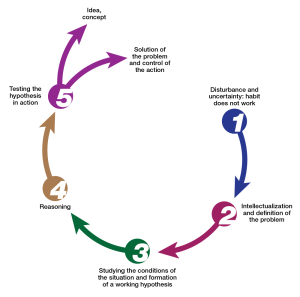3.2 The Beginning of Theories & Models of Reflective Practice – John Dewey

“We do not learn from experience. We learn from reflecting on experience.” – John Dewey (1933)
The fundamental theories and models of reflection and reflective practice were born initially from the work of Dewey and Schön. A century ago, John Dewey emphasized the importance of involving the learner in reflection. He believed that our experiences shape us, and when reflective practice is part of learning, meaning and relevancy is created, which initiates growth and change (Dewey, 1933).
Video: John Dewey
Sources
Dewey, J. (1933). How We Think: A Restatement of the Relation of Reflective Thinking to the Educative Process. Boston: D. C. Health


